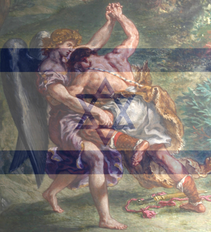| Every so often, we do well to return to our first principles of who we are – both individually and as a people. We do well to revisit our core origin story – the story we tell ourselves about who we are called to be. Whether amidst challenge or triumph, we do well to see with clear eyes how well we fulfill that call. Now is one of those times. |
I write these words on November 24, 2023 – staying home from court, glued to breaking news of the first hostage releases from Gaza. No doubt this context shapes the thoughts that follow, though this Torah portion has been on my mind and heart for some time for reasons that hopefully will become clear quickly.
By Rabbi David Evan Markus
Vayishlah 5784 (2023)
Note: These words come during the 2023 Israel-Hamas War, sparked by a terror attack on Israeli innocents that became the world's most lethal day for Jews since the Holocaust. Because current judicial ethics rules ban me from discussing the Israeli-Palestinian conflict,
I focus instead on some of the emotional and spiritual implications for us and Judaism.
Names are powerful. They can convey deep meaning about family, origins, identity, hopes and values. So it is for "Israel," whose name this week's Torah portion introduces in Yaakov (Jacob) wrestling and getting renamed for it (Gen. 32:25-29):
By Rabbi David Evan Markus
Vayishlah 5784 (2023)
Note: These words come during the 2023 Israel-Hamas War, sparked by a terror attack on Israeli innocents that became the world's most lethal day for Jews since the Holocaust. Because current judicial ethics rules ban me from discussing the Israeli-Palestinian conflict,
I focus instead on some of the emotional and spiritual implications for us and Judaism.
Names are powerful. They can convey deep meaning about family, origins, identity, hopes and values. So it is for "Israel," whose name this week's Torah portion introduces in Yaakov (Jacob) wrestling and getting renamed for it (Gen. 32:25-29):
| וַיִּוָּתֵ֥ר יַעֲקֹ֖ב לְבַדּ֑וֹ וַיֵּאָבֵ֥ק אִישׁ֙ עִמּ֔וֹ עַ֖ד עֲל֥וֹת הַשָּֽׁחַר׃ וַיַּ֗רְא כִּ֣י לֹ֤א יָכֹל֙ ל֔וֹ וַיִּגַּ֖ע בְּכַף־יְרֵכ֑וֹ וַתֵּ֙קַע֙ כַּף־יֶ֣רֶךְ יַעֲקֹ֔ב בְּהֵאָֽבְק֖וֹ עִמּֽוֹ׃ וַיֹּ֣אמֶר שַׁלְּחֵ֔נִי כִּ֥י עָלָ֖ה הַשָּׁ֑חַר וַיֹּ֙אמֶר֙ לֹ֣א אֲשַֽׁלֵּחֲךָ֔ כִּ֖י אִם־בֵּרַכְתָּֽנִי׃ וַיֹּ֥אמֶר אֵלָ֖יו מַה־שְּׁמֶ֑ךָ וַיֹּ֖אמֶר יַעֲקֹֽב׃ וַיֹּ֗אמֶר לֹ֤א יַעֲקֹב֙ יֵאָמֵ֥ר עוֹד֙ שִׁמְךָ֔ כִּ֖י אִם־יִשְׂרָאֵ֑ל כִּֽי־שָׂרִ֧יתָ עִם־אֱלֹהִ֛ים וְעִם־אֲנָשִׁ֖ים וַתּוּכָֽל׃ | "Yaakov was left alone, and a 'man' wrestled with him until sunrise. When [the man] saw that he had not prevailed against [Yaakov], he wrenched Yaakov's hip at its socket, straining it as he wrestled with him. [The 'man' said, “Let me go, for dawn is breaking.” [Yaakov] said, “I will not let you go until you bless me.” [The 'man'] said to him, “What is your name?” He said, “Yaakov.” [The 'man'] said, “Your name no longer will be Yaakov but Yisrael [=Israel], for you have striven with divinity and humanity, and prevailed.” |
Take this in: "Israel" literally means Godwrestler. All of the Children of Israel – and, I humbly suggest, everyone in any spiritual context – by definition wrestles the One some call God. Which begs a lot of questions.
| Note: Whatever one's beliefs, spiritual life beckons because it elevates ultimate concerns. Meaning and purpose, values and ethics, self-betterment and societal healing – these are the first focus. For this reason, life's inevitable disappointments and breaking are sure to challenge our sense of justice, right and especially God. In this way and several others, "wrestle" is built into the human experience, and therefore spiritual life. |

Context matters. Yaakov's physical wrestle happened when he was "left alone" (Gen. 32:25). Yaakov was "left alone" only because news had come about the approach of his brother Eisav, ostensibly bent on revenge for Yaakov taking the birthright. Fearing for his now large family's lives, Yaakov had sent gifts ahead to Eisav, then sent his family away from him into two camps to preserve them in case Eisav attacked (Gen. 32:8-9, Gen. 32:23-24). Only then was Yaakov "left alone" – exposed, separated from his family, afraid.
Yaakov was exposed, separated and afraid – and then wrestled.
There are times that try the soul. We've all had them. As a people, we're living through one now. Often they leave us feeling alone and afraid. Nearly always they leave us changed. And euphemistically, like Yaakov, we emerge with both a limp and a new name.
The limp – Our limp might be a loss of ease or innocence, loss of a beloved, loss of our sense of the basic rightness of things as we once understood it, or a loss of faith. Each of us can look back on our lives and easily see times of wrestle that left us transformed forever. And, as with Yaakov, the story doesn't end there.
The blessing of a new name – Yaakov said he wouldn't let his wrestling partner go without a blessing – a redemption for the wrestle and the limp. The blessing came as a new name, Israel, "for you have striven with divinity and humanity, and prevailed" (Gen. 32:29). In Hebrew, "prevailed" (וַתּוּכָֽל / va-tukhal) also means "made capable." Essentially, Jacob was renamed Israel for his growing capacity, strength and resilience (and his need for them).
Experience has forced Jews, and the State of Israel, to cultivate almost superhuman resilience amidst hostile neighborhoods, antisemitism, pogroms, Holocaust and more. There's always a risk that strength and resilience can harden into less fulsome qualities. For that reason, it's extra important that we hew to values and spirituality to tenderize the soul and seek the most harmonious balance we can achieve in this life.
"Israel" means not just wrestler but God wrestler. By definition, wrestling is intimate – direct contact, a shared unity from duality, one-on-One. It's not that God inherently wrestles but that we do – and God meets us in our wrestling. There's much to wrestle in this world, all of it implicating all of spirituality's ultimate concerns.
Put simply, we Children of Israel, we who are named for Yaakov's wrestle, must become Israel again and again. Our essential journey is to transform – and keep transforming – from the Yaakov of separation and fear to the ideal Israel of intimacy, unity and God-contact.
These moments remind me of the cactus pear, in Hebrew the sahbra. It's Israel's nickname for native-born Jewish Israelis, intending to convey a prickly outside but sweet and tender inside. Sahbras wring sweetness out of arid soil and bone-dry air, much as the State of Israel has done. Wrestling, Israeli life, and seemingly also Jewish life, all imply both resilience and capacity to modulate between hard and soft, prickly and sweet – for the world is of these.
Our calling is to not let prickles invade soft sweetness, and not let soft sweetness obscure the challenges and threats. The only way, Yaakov learns, is to engage directly with God, even by wrestling. Like Yaakov, we too might emerge with a limp, but we are resilient. We'll discover who we really are, all that we really can be amidst all, and who we must yet become.
Yaakov was exposed, separated and afraid – and then wrestled.
There are times that try the soul. We've all had them. As a people, we're living through one now. Often they leave us feeling alone and afraid. Nearly always they leave us changed. And euphemistically, like Yaakov, we emerge with both a limp and a new name.
The limp – Our limp might be a loss of ease or innocence, loss of a beloved, loss of our sense of the basic rightness of things as we once understood it, or a loss of faith. Each of us can look back on our lives and easily see times of wrestle that left us transformed forever. And, as with Yaakov, the story doesn't end there.
The blessing of a new name – Yaakov said he wouldn't let his wrestling partner go without a blessing – a redemption for the wrestle and the limp. The blessing came as a new name, Israel, "for you have striven with divinity and humanity, and prevailed" (Gen. 32:29). In Hebrew, "prevailed" (וַתּוּכָֽל / va-tukhal) also means "made capable." Essentially, Jacob was renamed Israel for his growing capacity, strength and resilience (and his need for them).
Experience has forced Jews, and the State of Israel, to cultivate almost superhuman resilience amidst hostile neighborhoods, antisemitism, pogroms, Holocaust and more. There's always a risk that strength and resilience can harden into less fulsome qualities. For that reason, it's extra important that we hew to values and spirituality to tenderize the soul and seek the most harmonious balance we can achieve in this life.
"Israel" means not just wrestler but God wrestler. By definition, wrestling is intimate – direct contact, a shared unity from duality, one-on-One. It's not that God inherently wrestles but that we do – and God meets us in our wrestling. There's much to wrestle in this world, all of it implicating all of spirituality's ultimate concerns.
Put simply, we Children of Israel, we who are named for Yaakov's wrestle, must become Israel again and again. Our essential journey is to transform – and keep transforming – from the Yaakov of separation and fear to the ideal Israel of intimacy, unity and God-contact.
These moments remind me of the cactus pear, in Hebrew the sahbra. It's Israel's nickname for native-born Jewish Israelis, intending to convey a prickly outside but sweet and tender inside. Sahbras wring sweetness out of arid soil and bone-dry air, much as the State of Israel has done. Wrestling, Israeli life, and seemingly also Jewish life, all imply both resilience and capacity to modulate between hard and soft, prickly and sweet – for the world is of these.
Our calling is to not let prickles invade soft sweetness, and not let soft sweetness obscure the challenges and threats. The only way, Yaakov learns, is to engage directly with God, even by wrestling. Like Yaakov, we too might emerge with a limp, but we are resilient. We'll discover who we really are, all that we really can be amidst all, and who we must yet become.



 RSS Feed
RSS Feed